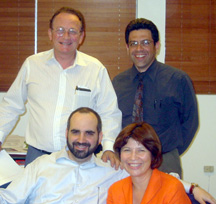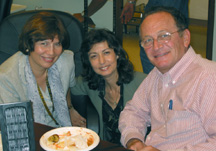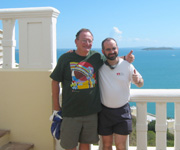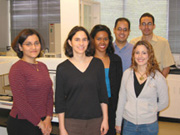To say Edmundo Kraiselburd, Ph.D. is excited about the mentoring program between UNMC and the University of Puerto Rico would be an understatement.
 |
Front row, from left, Howard E. Gendelman, M.D., and Loyda Melendez, M.D. Back row, from left, Edmundo Kraiselburd, Ph.D., and Carlos Luciano, M.D. |
Dr. Kraiselburd, professor of microbiology and director of the unit of comparative medicine at the University of Puerto Rico, said: “The best word to describe it is fantastic. It goes way beyond what I expected.
“There has been excellent chemistry (between the two universities), which is important for team work. There has been nice interaction – both scientifically and personally – these past two years.”
The partnership evolved from a grant in 2002 from the National Institute of Neurological Disorders and Stroke (NINDS), one of the institutes making up the National Institutes of Health.
Under the grant, two universities – UNMC and Johns Hopkins University – were selected to promote mentoring between established and minority institutions. The grant, which was split between the participating institutions, totaled about $5 million over five years.
Loyda Melendez, M.D., the program’s leader at the University of Puerto Rico, chose to partner with UNMC because of the university’s track record in studying the neurological consequences of HIV infection.
“UNMC is a leader in the field and has an outstanding record for training inexperienced researchers to become independent scientists with their own labs and grants,” Dr. Melendez said. “I’m glad to have established this collaboration. The two universities will benefit from each other greatly.”
The partnership realized its first tangible research breakthrough on Monday when a research project was highlighted in the June 24 issue of Neurology. The collaborative research study resulted in findings that might eventually lead to the use of a blood test to determine if HIV patients have HIV-associated dementia (see related story in UNMC Today).
 |
Loyda Melendez, M.D., Valerie Wojna, M.D. and Edmundo Kraiselburd, Ph.D. |
Dr. Kraiselburd had special words of praise for Howard Gendelman, M.D., who is heading the mentoring program at UNMC. Dr. Gendelman is professor of pathology and microbiology at UNMC and director of the Center for Neurovirology and Neurodegenerative Disorders (CNND).
“I am very thankful to Dr. Gendelman, and I mean it,” Dr. Kraiselburd said. “I had instant chemistry with Dr. Gendelman. I consider him part of my family – both scientifically and personally. Dr. Gendelman is a leader scientifically, and the way he interacts with people here and the teamwork he demonstrates is superb.
“Dr. Gendelman is a terrific partner. A terrific leader. He gives us everything we need, and he does it immediately.”
To recognize Dr. Gendelman’s contribution, Jose Carlo, M.D., chancellor of the University of Puerto Rico, made Dr. Gendelman an adjunct professor at the university earlier this year.
The University of Puerto Rico in San Juan has campuses for medical sciences, nursing, allied health professions, pharmacy and dental studies. The program requires collaboration within UNMC as well as with the University of Puerto Rico.
 |
The friendship of Edmundo Kraiselburd, Ph.D., left, of the University of Puerto Rico, and UNMC’s Howard Gendelman, M.D., is one of many that have been formed through the partnership. |
Dr. Gendelman enlisted researchers from a variety of UNMC departments to participate in the research. “The beauty of this program is its depth,” Dr. Gendelman said. “It involves people at UNMC who wouldn’t normally be involved with each other, and people who don’t usually work on grant-related projects.”
In addition to Dr. Gendelman, Kim Carlson, Ph.D. and Xiaoguang Luo, M.D., of the CNND and the department of pathology and microbiology, are the other lead investigators on the study; Jim Anderson, Ph.D., professor and chairman of the department of preventive and societal medicine, serves as the study’s statistician; Mike Dierks, in the department of information technology services, helps with communication between the universities; and Robin Taylor of the CNND is the administrative liaison.
Though Omaha and San Juan are thousands of miles apart, Dierks, an information specialist, found a way for the universities to communicate that shrinks the distance at the click of a mouse.
“The two universities use a new computer program from TeraGlobal Communications Corp. for weekly videoconferencing,” Dierks said. “With the program, both parties can see clear video images in real time, hear each other perfectly and share research data through the same computer applications.”
 |
Toni Biskup of the CNND, second from left, worked with many colleagues from the University of Puerto Rico through the partnership, which promotes mentoring. |
Dr. Kraiselburd is looking forward to coming to Omaha sometime in the future. When he comes, he is looking forward to eating Nebraska beef. “I keep telling the Nebraska people that Argentina beef is better than Nebraska beef,” he said. “I want to have the opportunity to compare. But, I won’t be impartial. I was born in Argentina.”